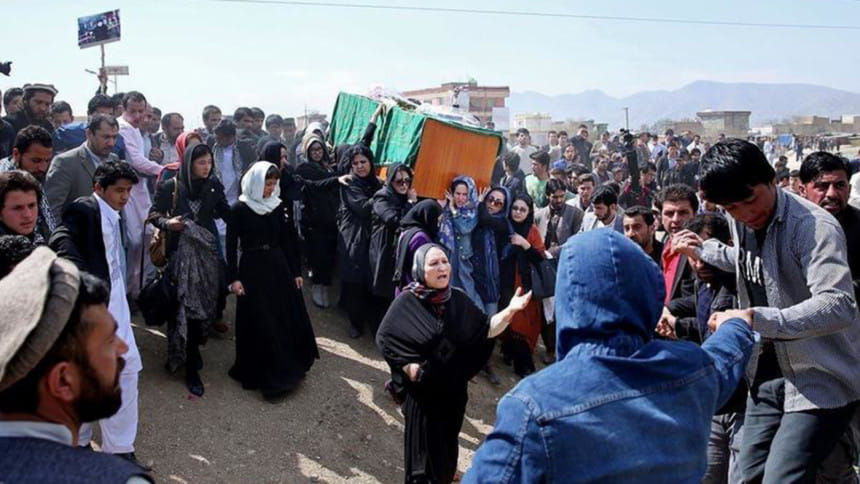Afghan police jailed over mob death

Eleven Afghan policemen have been sentenced to one year in prison for failing to protect a woman killed by a mob in the capital Kabul in March.
The 28-year-old woman called Farkhunda was beaten to death after being accused of burning a copy of the Koran, although witnesses say she did not.
Earlier this month four men were sentenced to death for her murder, with eight others handed jail terms.
The incident led to widespread protests against the treatment of women.
The judge said there was no evidence against a further eight police officers, who were acquitted. The 19 police officers stood impassively in the dock as the sentences were read out.
"You are sentenced... for negligence of duty to one year in prison," Judge Safiullah Mojaddidi told those found guilty.
"The two groups that we have issued our verdicts on have the right to appeal. They can submit their lawful objections to the appeal court within the lawful period of time against our decision if they are not satisfied," he added.
The treatment of police in this case has immediately been condemned as too lenient. One MP, Farkhunda Naderi, called it a symbolic verdict and said the wrong people were in the dock. She said that the Kabul police chief should have been put on trial.
The one-year sentences for failing to stop the killing contrasted with the four death sentences and eight long prison sentences handed down earlier this month to the men in the mob who killed Farkhunda.
The judge took longer to consider his verdicts in the case of the police. And Afghan justice itself has been put in the spotlight in this case as never before.
The failure of the court to ensure that defendants were represented, the swift verdicts for those who killed Farkhunda, and now the very light sentences imposed on some police officers, will not satisfy those who feel that justice has not been done.
"We have nothing more to say about this new verdict. We have already expressed our concern about the whole process," Farkhunda's brother Mujibullah told AFP. The family were not in court.
Farkhunda had argued with an amulet seller about his practice of peddling charms to women at the well-known Shah-Du-Shamshaira shrine, which is within walking distance of the presidential palace and Kabul's main bazaar.
The amulet seller is one of those sentenced to death earlier this month.
In the course of the argument Farkhunda was accused of burning the Koran and a crowd overheard and attacked her.
In confession statements read in court, some of the accused admitted they had been drawn in by the claims.
An official investigator has said there is no evidence she burned the Koran.
Violence against women, and violence in general, are common in a country that has been at war for over three decades.
But even against that backdrop, the attack on Farkhunda on 19 March shocked many Afghans, taking place as it did in the heart of the capital and under the eyes of the police.
Farkhunda was beaten to death before her body was driven over by a car, dragged through the streets and then set on fire.
Some of the attackers recorded the brutal killing on their cell phones and footage was later uploaded to social media sites,

 For all latest news, follow The Daily Star's Google News channel.
For all latest news, follow The Daily Star's Google News channel. 



Comments